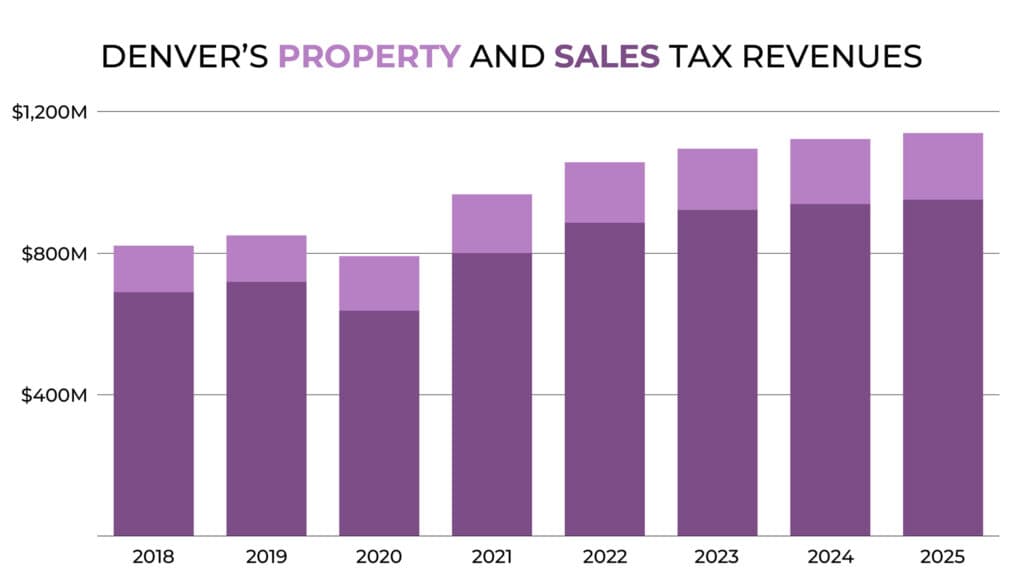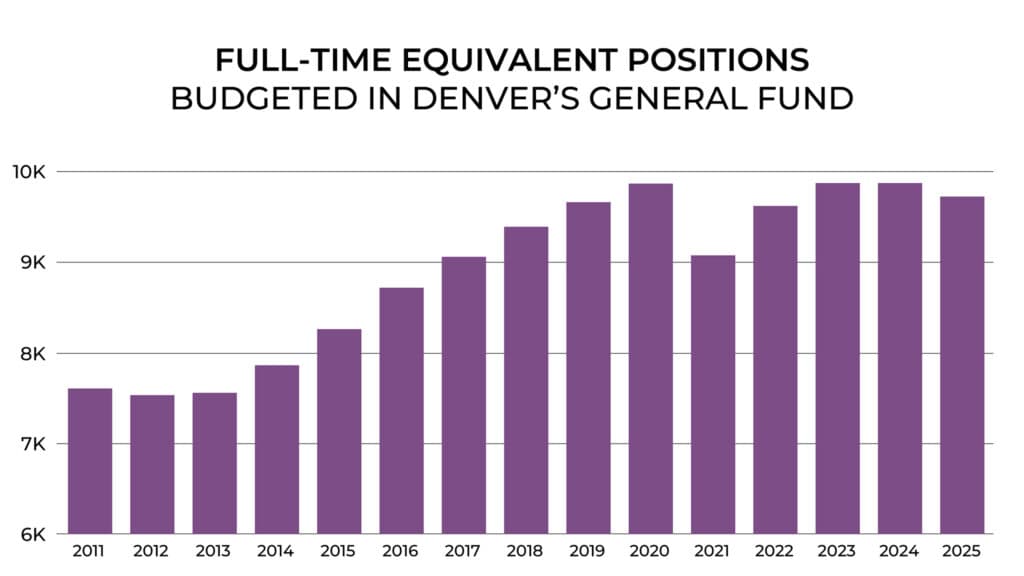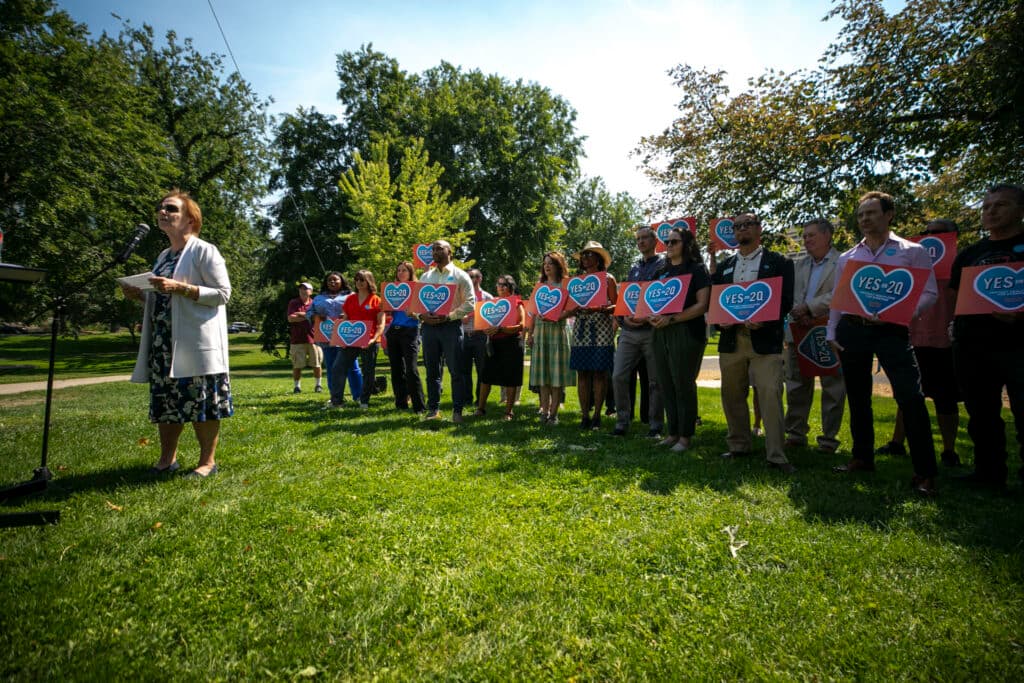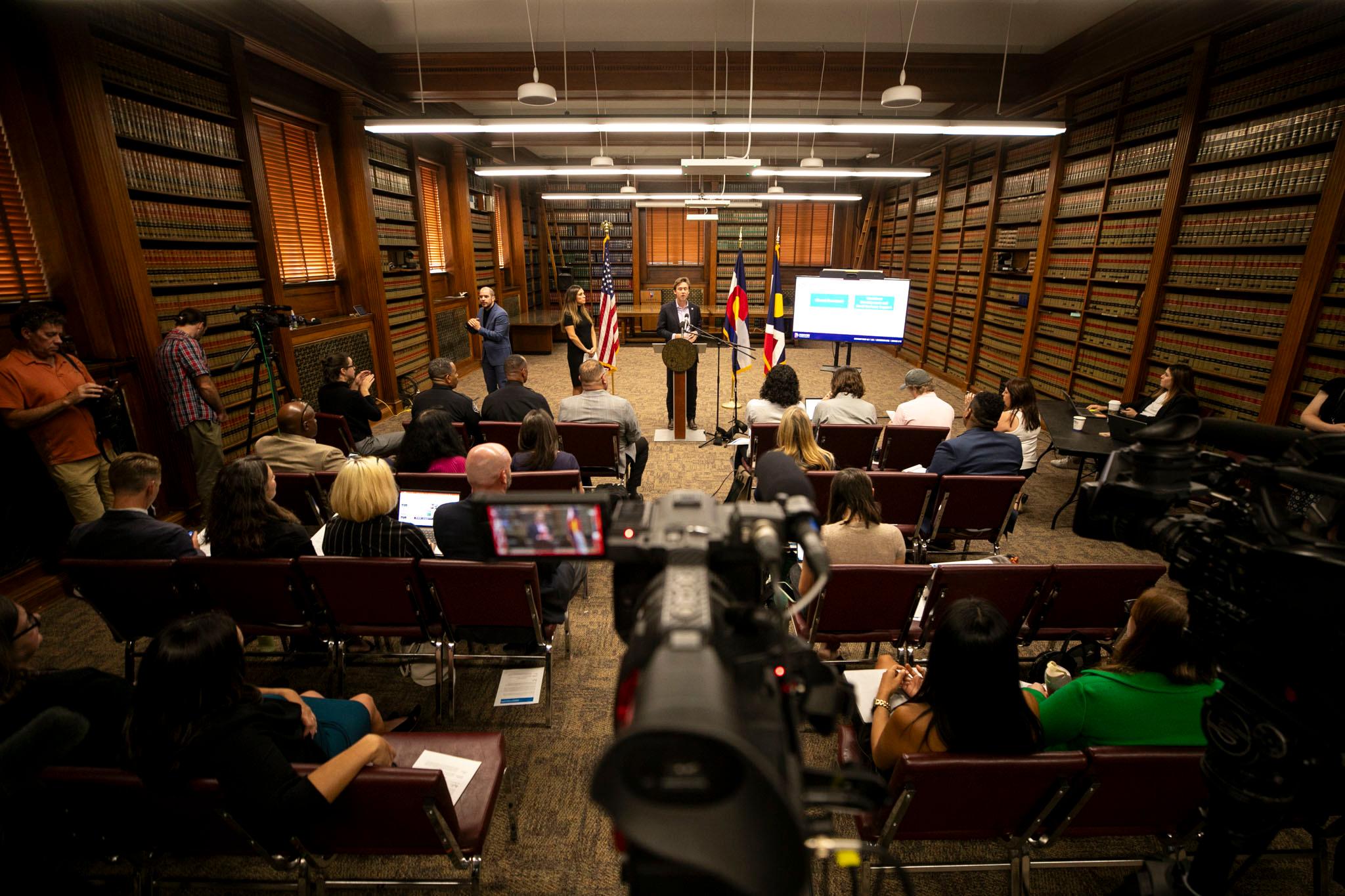The big headline of Denver’s budget this year is that the city will have to tighten its belt, as consumer spending and softening sales tax revenue is slowing growth for cities across the country.
Mayor Mike Johnston released his 2025 budget Thursday. In case you don’t have time to read a nearly 800 page document, here are the key takeaways from the proposal.
The budget is tighter than usual this year.
Denver’s 2025 budget will see its slowest growth since 2011 and the first reduction in full-time employees in a decade, not including the pandemic.
Next year’s budget is growing by just 0.6 percent. In comparison, the city projected 4 percent revenue growth for 2024, the current budget year.
“Keeping our growth at this size involved several tough decisions,” said Nicole Doheny, chief financial officer for the city.
There would not be furloughs or layoffs under this proposal. To save costs, the mayor’s office is leaving open vacant positions, reducing spending on supplies and making use of city reserves.
Denver has about $14 million more in pandemic recovery money to spend as well.
Other cities have also seen slowing growth. Seattle has a $260 million funding gap, and Los Angeles cut 1,700 vacant positions.

Spending on homelessness and new immigrants is decreasing.
The city is spending a lot less on homelessness programs, compared to last year. But 2024 was an unusual year for that spending, since the city made major one-time purchases of things like hotels to use as shelter. Those were paid for with a mix of federal and local money..
Funding for Johnston’s homelessness program, All In Mile High, is decreasing from $141 million in 2024 to $57.7 million in 2025. Johnston said the focus will be on funding for the city’s programs, rather than on capital costs like buying property.
In a press conference Thursday, Johnston called it “one of the lowest carrying costs for homelessness resolution in the country.”
But some anti-homelessness programs are also seeing cuts. Funding for rental assistance is decreasing, from $30 million to $20 million, even as evictions reach record-breaking levels. Last year, nonprofits, advocates and a group of city council members made rental assistance one of the top sticking points of Johnston’s 2024 budget, securing an additional $13.5 million for renters facing eviction.
As the number of new immigrants arriving in the city has decreased, that funding is dropping as well, from $90 million in 2024 to $12.5 million in 2025. That was one of Denver’s biggest unexpected costs in 2023 and early 2024.
Since new immigrants started arriving at the end of 2022, the city has received some state and federal reimbursements for supporting immigrants. But when Republicans in Congress killed a bipartisan immigration reform bill earlier this year, it left more of the cost to the city, and Johnston imposed budget cuts in response.
Johnston is still focused on growing Denver’s police force.
Similar to last year’s budget, the 2025 budget includes funding for 168 new police recruits, plus 24 new firefighters and 60 new sheriff’s deputies. And like last year, Johnston said the goal is for new police recruits to outpace retirements in order to grow the force. Denver Police has struggled with understaffing in the past few years.
Denver’s police alternative, STAR, is getting a bump. The program, which sends mental health responders and paramedics to nonviolent calls, would get $6.9 million, up from $6.2 million in 2024.
Growing STAR is something some council members and advocates have asked for in the past. Last year, a group of council members tried to repurpose nearly $4 million of police funding for STAR, but that amendment failed amid questions about whether the program could spend all the money at its current capacity.
STAR has room to grow. It responded to more than 7,000 calls in 2023, its highest response rate since it started in 2020. But staff said 15,000 calls were eligible for STAR responses — they just didn’t have the resources.
City employees would get raises under the proposed budget.
Johnston is proposing an average 4 percent merit raise for employees.
Johnston said that’s in response to the many emergencies staff have responded to, including COVID-19, homelessness and the spike in new immigrants.
“Our city employees over the last four years have seen more days of emergency operation than the city of Denver saw the previous 40 years before that,” Johnston said. “I think it's important to both invest in those employees, support them and retain them.”
The city didn't immediately respond to a question about the cost of raises.

City council and homeless advocates got a few wins.
Johnston responded to calls from some city council members and homelessness advocates to improve the availability of emergency shelters during cold weather. Council members Shontel Lewis and Sarah Parady introduced legislation in November that got shelved at the time. But on Thursday, Johnston said he would implement a key change from their proposal.
The city is budgeting $1.2 million to open cold-weather shelters when the temperature drops to 25 degrees, instead of waiting for temperatures to go as low as 20 degrees, which is the current policy. The shelters will also stay open for 24 hours, rather than just 12-hour stints. The city expects that move will increase the number of days those shelters are open from 40 days to 80 days per season.
To open the new cold-weather shelters, the city is shutting down and converting its immigrant shelters. The number of new immigrants arriving in the city has dropped sharply since last winter.
Denver also will start an Office of Community Engagement at a cost of $200,000, something city council has been researching for the past few years and has proposed in past budgeting cycles. The office will specialize in neighborhood outreach.
And businesses that will be affected by downtown construction will also get more money for support, with an added $2.5 million for businesses affected by 16th Street Mall and Colfax Avenue projects.
Denver Health is still in trouble.
One of Colorado’s only safety net hospitals is facing a major funding crisis. Costs of care for patients — many of whom lack insurance — have skyrocketed, while money from the city and private insurance has stayed relatively flat for many years.
Supporters of the hospital are running a ballot measure that would add a 0.34 percent sales tax to raise about $64 million for Denver Health. Without it, CEO Donna Lynne has said the hospital might need to cut services.
We don’t yet know if the tax hike will pass this November.
Meanwhile, the city is promising an increase to its own contribution. Johnston touted a 3 percent increase in the city’s budget for the hospital at his press conference Thursday. But Denver Health CEO Donna Lynne said that basically amounts to an adjustment for inflation. She was hoping for $30 million in emergency funding for the hospital in case the ballot measure doesn’t pass.
“This is literally inflation for a minuscule part of our budget,” she said. “We lose money on almost all the services we provide to the city.”

What’s next for the budget?
Next, different departments will come to city council to explain their plans for the next budget year. That will happen between Sept. 16 and 20, and it’s a good chance to find out what different city agencies are up to — you can find that schedule here.
In October, council will have a chance to make recommendations to the mayor, who must release his final budget draft by Oct. 21.
On Oct. 28, the public can weigh in on the budget at city council’s public hearing. Also, throughout October, city council can pass amendments to the budget. Those amendments must be approved by the mayor or overridden if Johnston chooses to veto them instead.
City council must vote on the final budget by Nov. 12. Here’s the full schedule.













